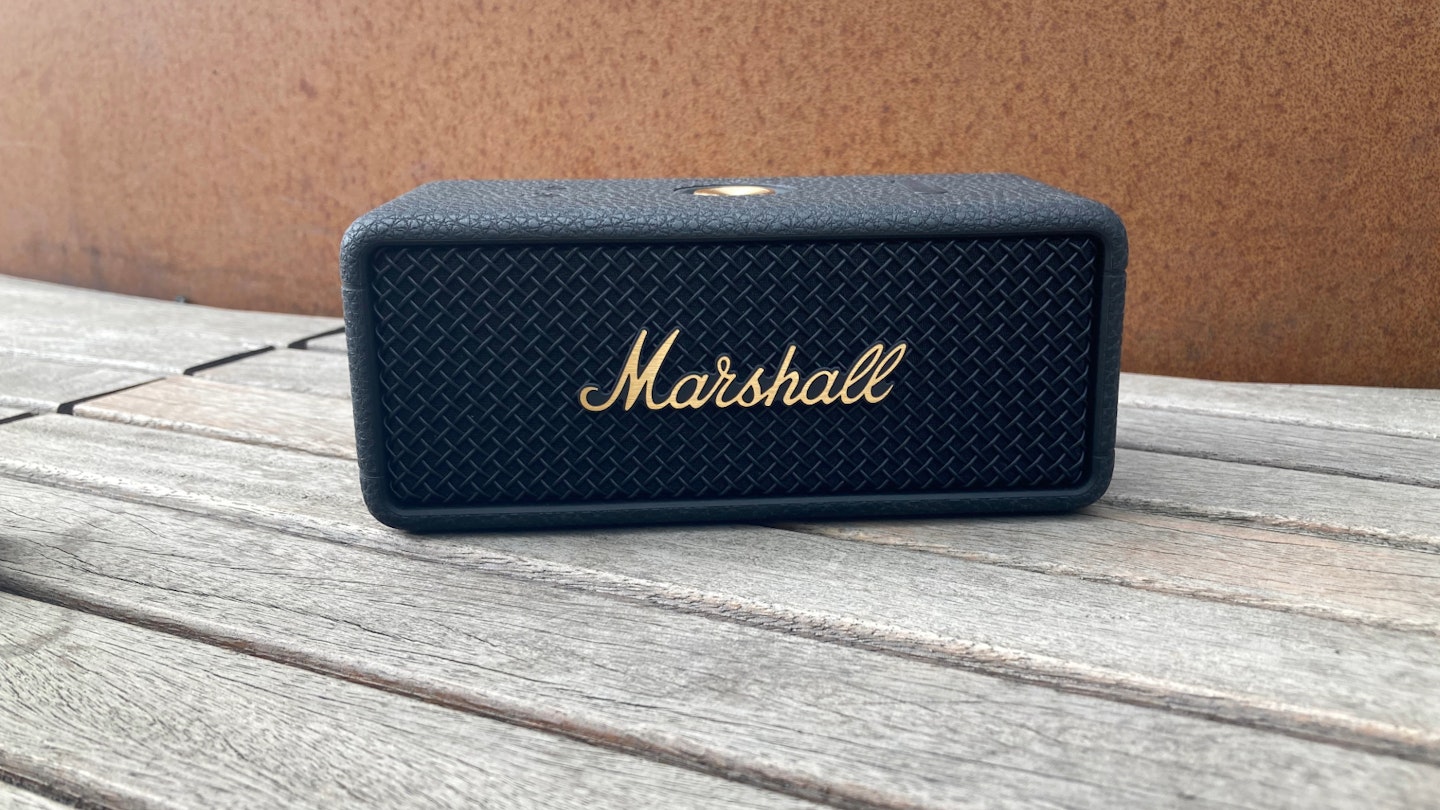1962 was a year of significant British pop culture firsts: the first Beatles single, the first episode of University Challenge, the first Bond film and the first Marshall amp.
More than 60 years later and Marshall is still going strong. The brand which highlights its heritage is now one of the biggest names in audio and has an array of Bluetooth speakers sporting their signature (literally) logo. Several of these are considered by the experts at What's The Best to be among the best speakers available.
Now they've added two more to the mix – the Marshall Willen II and the Marshall Emberton III. As the names imply, these are the next generation of existing Marshall models, and ones which have already impressed with their sound and style.
Before you read our reviews of the Willen I and Willen II, it's time to find out whether the third version of the Emberton goes a step further than its predecessors. What's The Best Deputy Ed David Ker has put the brand-new speaker to the test.
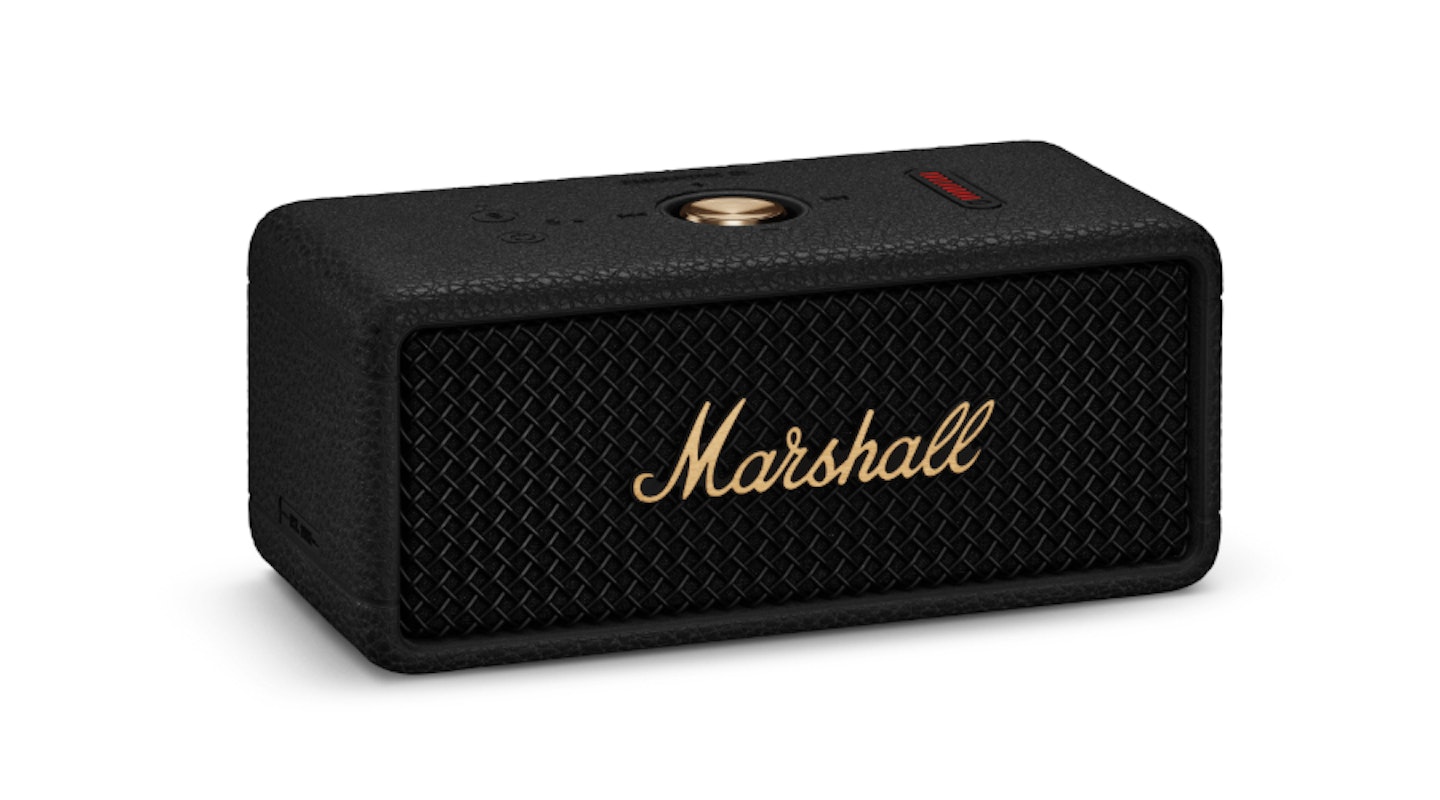 Marshall
Marshall Launched in 2024, the third generation of the Marshall Emberton portable Bluetooth speaker.
Pros
- Superb 'true stereophonic' sound
- Slick design
- Excellent battery life
Cons
- Few improvements on previous model
| Drivers | 2" 10W, two passive radiators |
| Audio power | 38W Class D amp (x2) |
| Battery life | 32+ hours |
| Charging time | Approx 2 hours |
| Waterproofing | IP67 |
| Dimensions | 160 x 68 x 76.9 mm |
| Weight | 670g |
Blast from the past

Am I alone in thinking that the iterations of Marshall speakers sound like members of political dynasties? Marshall Stockwell the second, Marshall Emberton the third… Surely, they're members of a US family who made their money in oil.
Marshall's is, in fact, a rich history of a different sort. Starting life from a shop in Hanwell, London, it can boast members of Deep Purple, Led Zeppelin and The Who as early patrons. While production now takes place on a grander, worldwide scale, it is clearly proud of its past.
I'm a fan of the sleek and refined design which is consistent across its speaker range, and which is a nod to the company’s origins (as well as to those of modern audio in general).
New and improved?
The Emberton III is available in a black or cream textured silicone shell, a homage to the vinyl which encased the amplifiers for which the brand first became known. The solid metal grilles are equally retro. The speaker is the same size as the Emberton II (its a similar length to an average smartphone) though the arrangement and choice of buttons differs slightly, but it's otherwise difficult to tell it apart from its predecessor.
What distinguishes this new release from Marshall can, instead, be found in the features. A built-in microphone is a new addition, as is 32-plus hours of playtime. It's also ready for the next Bluetooth technology LE Audio, enabling Auracast. This will introduce a 'share audio' feature (soon to be available via an over-the-air update in the Marshall app) which will allow the Emberton III to act as a source device through which you can broadcast music to other Marshall speakers which support the technology. By connecting your phone to one speaker it will sync audio to the others. This replaces the stack mode previously employed by Marshall to link up speakers of the same model.
I was able to make calls using the Emberton III and it made good on its battery life promise. Intermittent use over a week or so saw its charge deplete by about a third. A full recharge using the provided USB-C cable and my own power adapter takes around two hours.
Superior sound
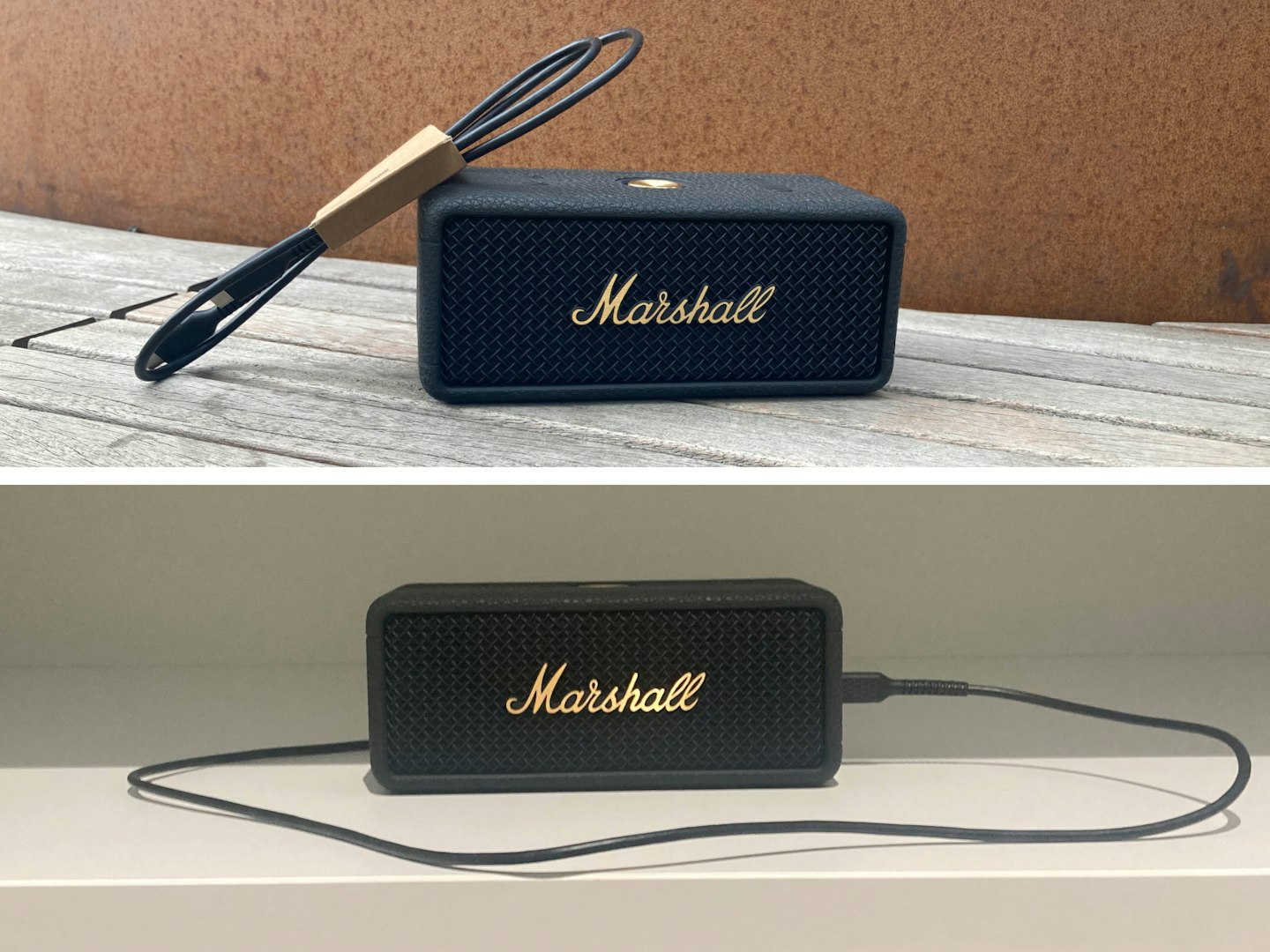
The sound, which Marshall refers to as 'True Stereophonic', is excellent. Grilles at the front and rear essentially means that the audio is multidirectional, producing, in the manufacturer's words: "superior spatial and binaural sound that flows around you, filling any space". This is achieved with two 38W Class D amplifiers, two 2-inch 10W drivers and two passive radiators.
The Emberton III's output is powerful and crisp. Marshall has built a reputation for sound quality and its continues to deliver here. From classical to Americana and new wave to country, it's a pleasure to listen to and volume, play/pause and skip are easily adjusted using the unit's brass control knob.
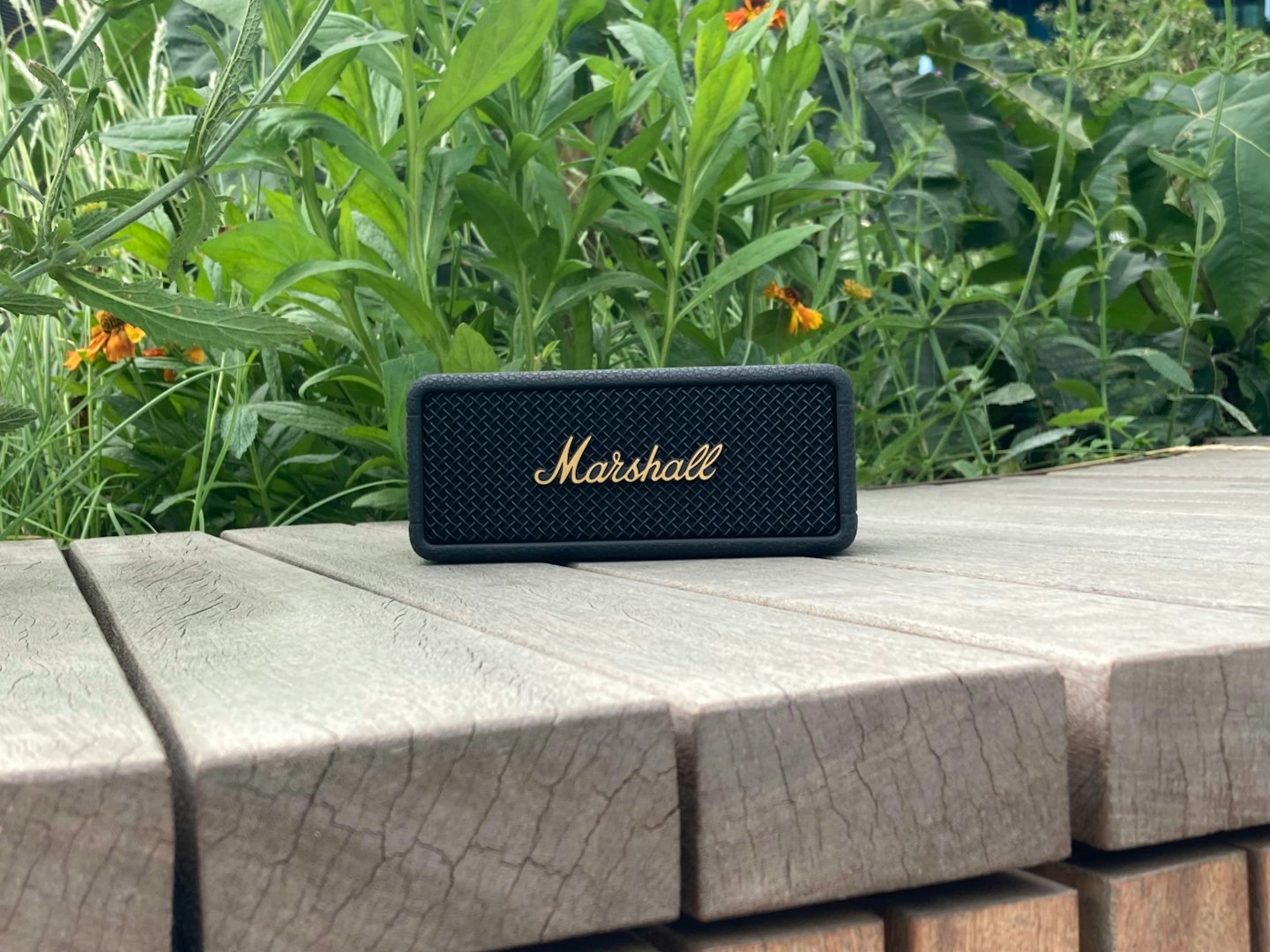
As with any portable Bluetooth speaker, compromises are made on precision when pushing the volume to its limits. However, the Emberton III still performs well at this upper end. And, really, units of this size should be judged by how well they can manage the sort of volume that's going to be desired on a day-to-day basis. Viewed in these terms it excels.
Sweet spot
Songs by bands used to standing in front of Marshall amps on stage continue to be served well by the company in this consumer context. Angus and Malcom Young's riffs and Phil Rudd's drum hooks in 'You Shook Me All Night Long' blast out of the Emberton III, while the lyrics gloriously belted by Brian Johnson remain refined.
Indeed, unlike many other speakers of a similar price point (its RRP is £159), it successfully retains clarity when it comes to vocals and the spoken word without sacrificing on instrumentals and bass. As someone inclined to split their listening time between music and podcasts, I found this to be a significant asset.
This is particularly impressive in such a compact unit. As mentioned, it takes up very little space and weighs just 670g. It can be held with one hand but does also feature a hole through which to attach a carry strap (not provided). I was pleased to discover that the material used to make the speaker is PVC-free and that 79 per cent of the plastic which has been used is recycled.
Any downsides?
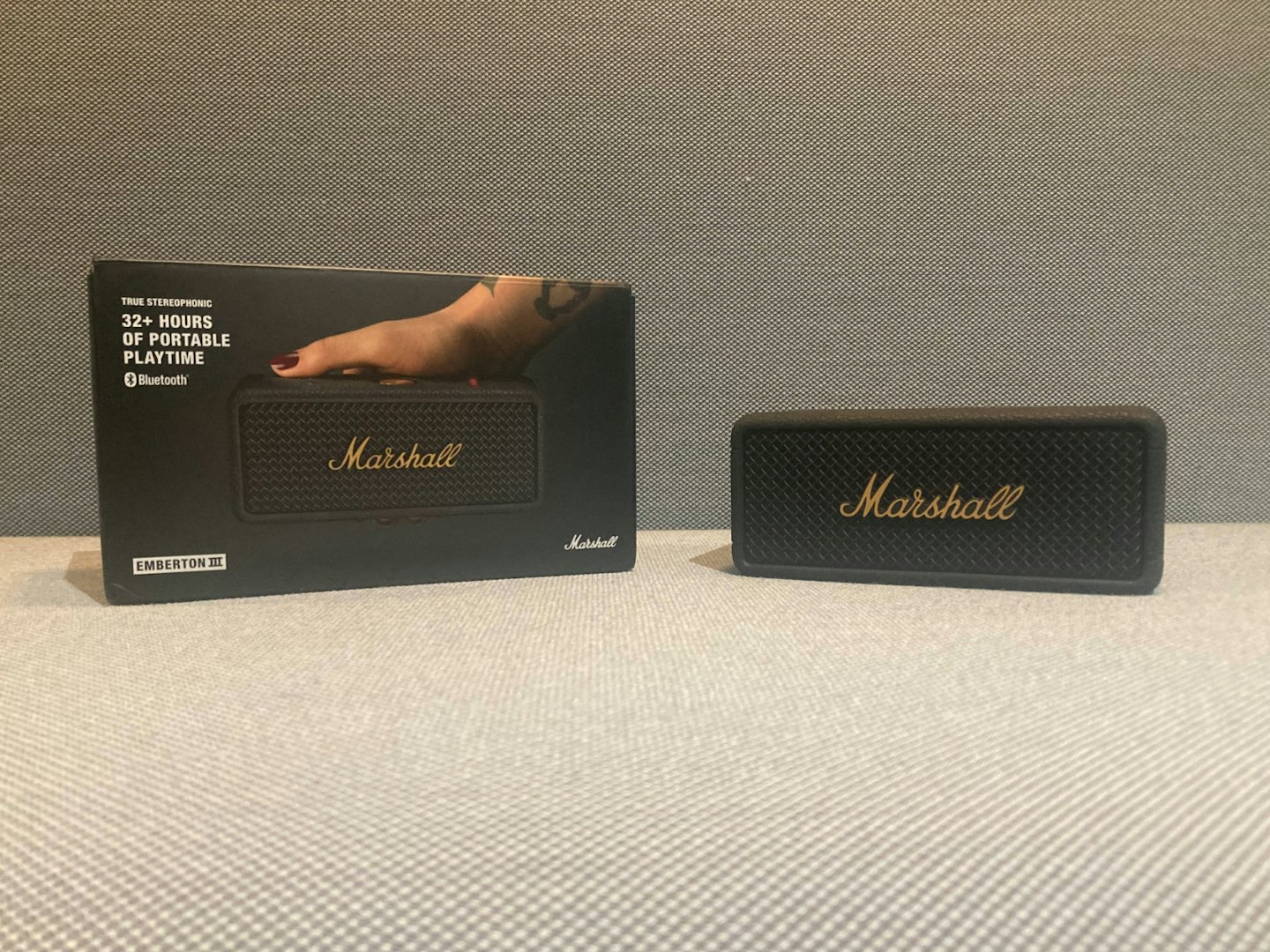
As should be clear, I have few gripes with the Emberton III when it comes to sound. However, I can largely say the same for its predecessor (the Emberton II), and that in itself might be an issue.
If you are hoping for a meaningful upgrade, you will hear some improvement in audio due to a change in the amplifiers from 10W to 38W. Elsewhere, there's the new mic, an increase in playtime by a couple of hours and the ability to utilise LE Audio (the latter is almost certainly the driving force behind the decision to launch a new version of the Emberton).
Call me greedy, but I'd liked to have seen more. There remains no personalised EQ control within the Marshall app (though the three presets – 'Marshall', 'Push' and 'Voice' – are useful) and there are no other bells and whistles when it comes to functions.
It's also a speaker which, despite marketing efforts to imply otherwise, to me still feels much more suited to a domestic setting than wider world adventures. This is influenced by the speaker's look rather than its specs as it has an IP67 rating (a measure of dust and water resistance in which it performs admirably) and, as discussed, is certainly small enough to throw in a bag on your way out the door.
Price and competition
For a speaker of a similar price which looks more at home outside you can pick up the Ultimate Ears Boom 4 for £130. Alternatively, break the budget with the Everboom (RRP £249.99) and benefit from some handy features which the Emberton III lacks. When reviewing I found that you can turn it on and off using the app, set an alarm and wake up to your favourite song, and make announcements at a party through the speaker using your phone's mic.
Other brands which share a reputation for sleek style with Marshall include Bose, Sonos, Beats by Dre and Bang & Olufsen. Of these, Beats have a product of the same cost in the recently released Beats Pill.
Alternatively, if you're seeking something more brash in design but equally bold when it comes to sound, JBL have plenty to offer. The JBL Charge 5 can be found for £20 or so more than the Emberton III and, likewise, performed well when tested.
Who is it for?
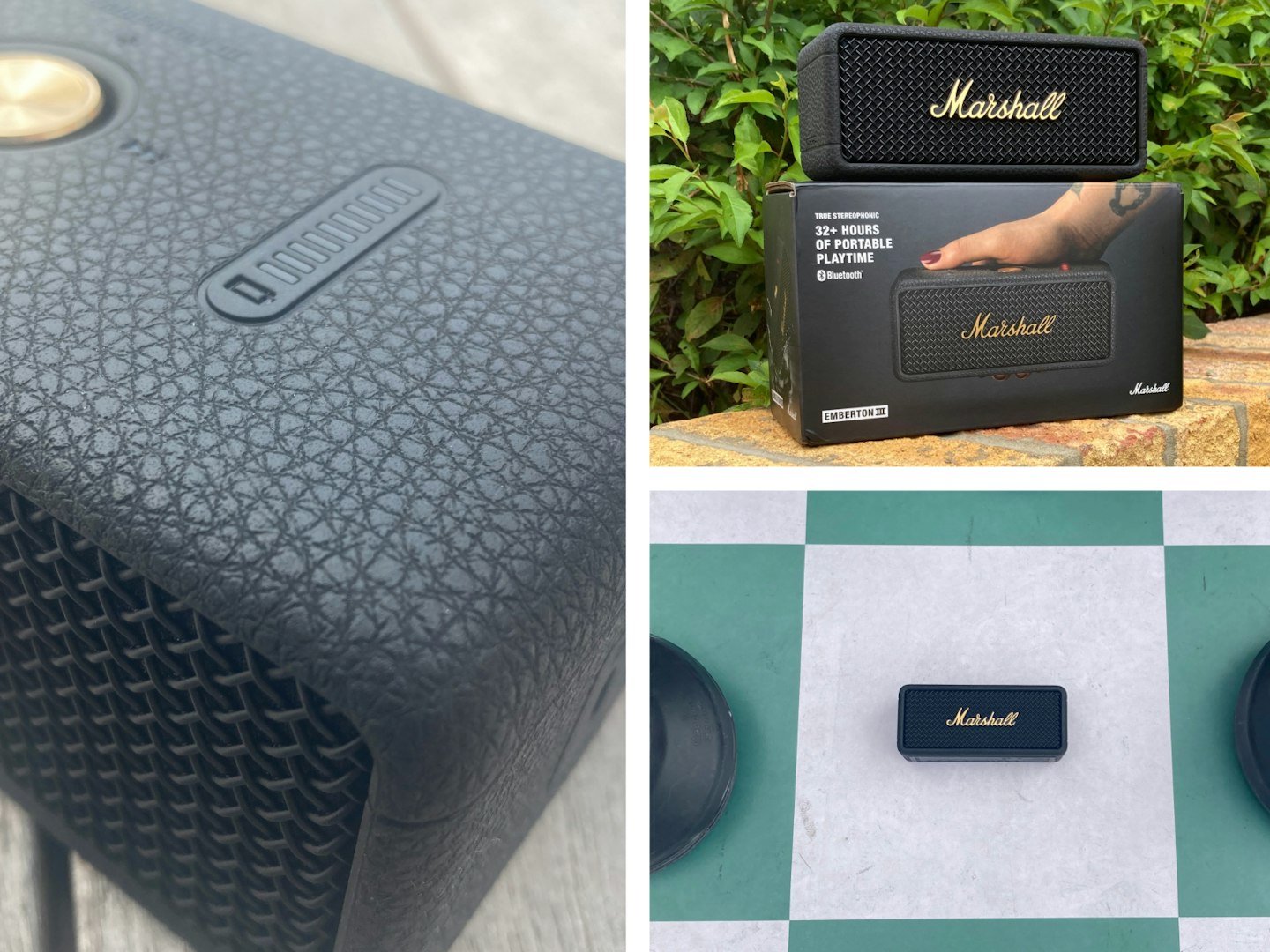
This speaker doesn't offer a plethora of functions but what it does do it does superbly well. Tech of this sort and price must succeed in the basics to justify its position in the marketplace and a speaker first and foremost is a means to listen to music (and, increasingly, other audio).
Marshall have created a unit which facilitates just that and does so in a neat form which oozes class. Granted, you might get the same or similar with its predecessor, but with a move towards new Bluetooth technology you risk being left in the lurch should you wish to expand your Marshall collection.
Would we recommend it?
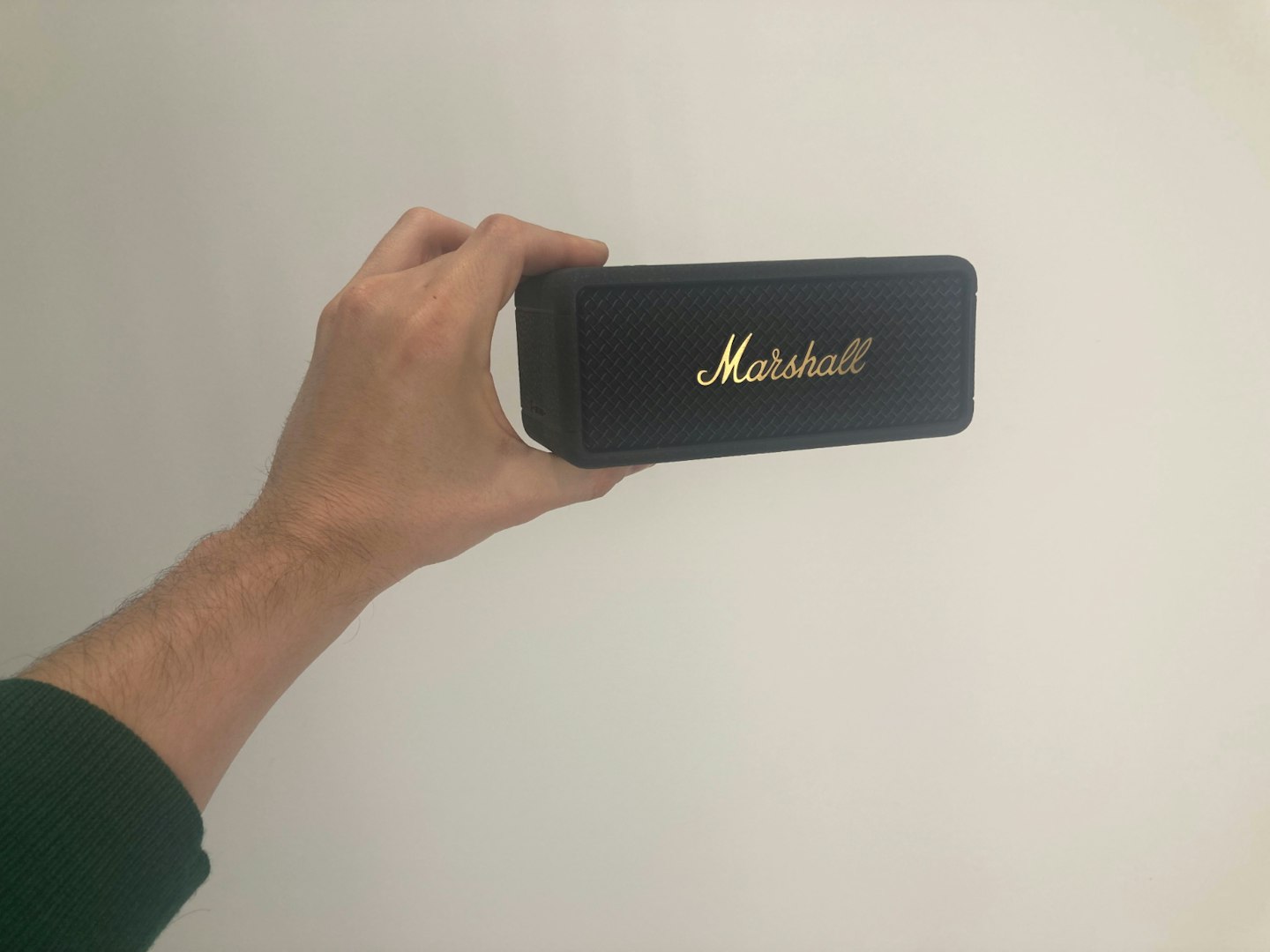
I have no hesitation in recommending this speaker. I happen to appreciate its design and that of the Marshall range in general. There are other options near the Emberton III's price point which offer marginally more power (see our rundown of the best Bluetooth speakers for bass), but if you intend on putting your purchase on display then, really, you want to like what you're looking at. I don't see the value in sacrificing aesthetics for slightly better bass at high volume levels. Anyway, if you want to crank it up to 11 or have your speaker do the heavy lifting at a party, you'll be better served by something which takes up more surface space.
But where style is always subjective, substance is often not, and here Marshall can point to its pedigree. There's a reason it has maintained and grown an audience of devotees over more than half a century in business. Ease of use and quality sound feature here, and based on the success of other Marshall creations I'm given no reason for believing that it will falter on those fronts in the future.
For a speaker which encapsulates a musical legacy in its look and feel but which furthers the story when it comes to audio output and technical sophistication, you'd do well to consider the Marshall Emberton III.
More items to consider
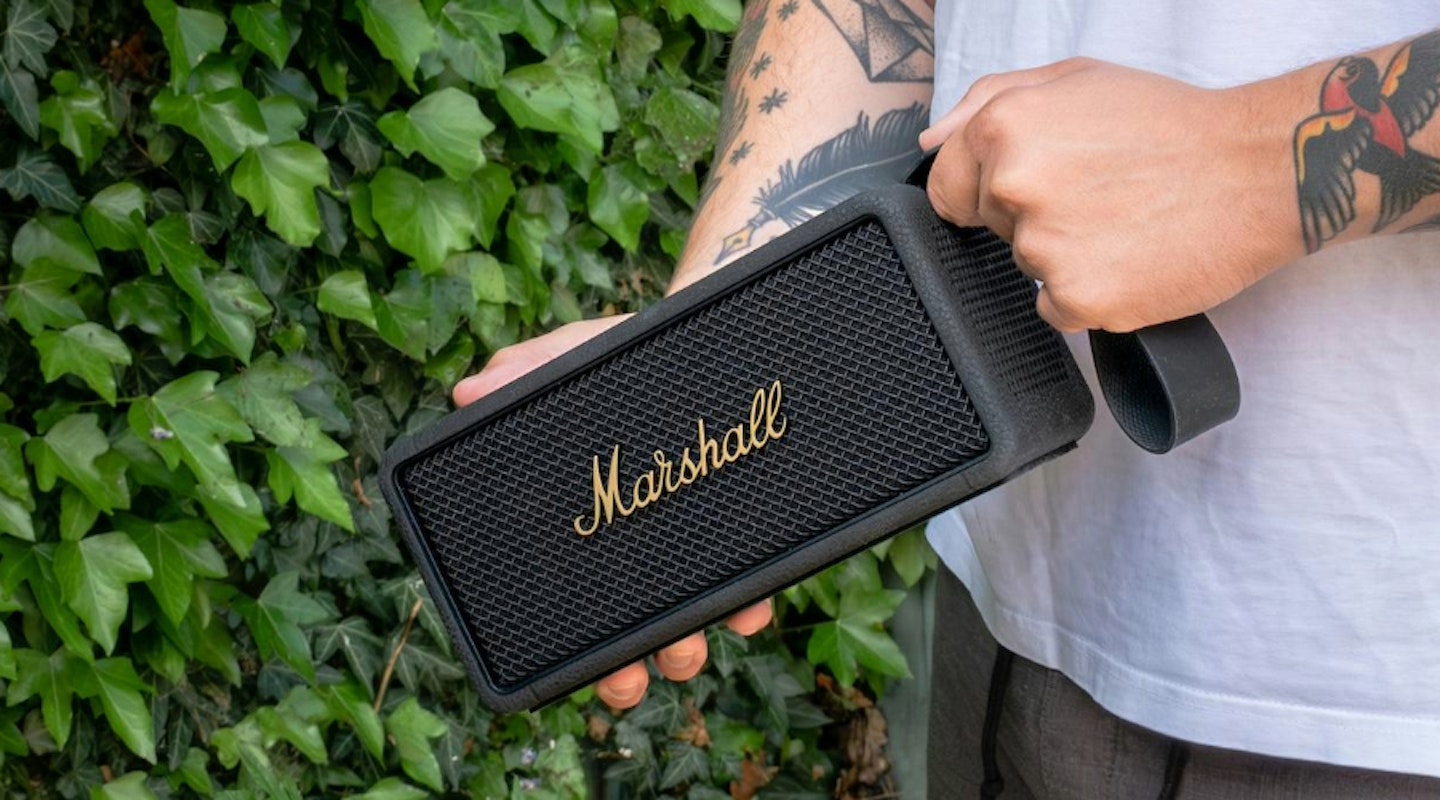 William Austin-Lobley/WTB
William Austin-Lobley/WTBAnother option from Marshall. Larger, more powerful and highly-regarded by What's The Best Editor William Austin-Lobley in his review. It has an RRP of £270 but thanks to a 2023 release date can now be picked up at a significant discount.
Pros
- Excellent, expansive sound
- Robust build and battery life
- Timeless design
Cons
- Too heavy to be super portable
| Drivers | 2x 3” 15W woofers, 2x 3/5” 10W tweeters, 2x passive radiators |
| Connections | Bluetooth 5.1, Aux-in |
| Charge | USB-C |
| Battery | 20+ hours |
| Weight | 1.8kg |
| Size | 109 x 230 x 95 mm |
| IP rating | IP67 |
- Available in Black and Brass, Cream
- Two 20 Watt Class D amplifiers for the woofers
- Two 10 Watt Class D amplifiers for the tweeters
- 20 minutes charge gives 2 hours of playtime
- Box Contents: Middleton speaker, detachable carry strap, user manual and legal and safety information, USB-A to USB-C charging cable
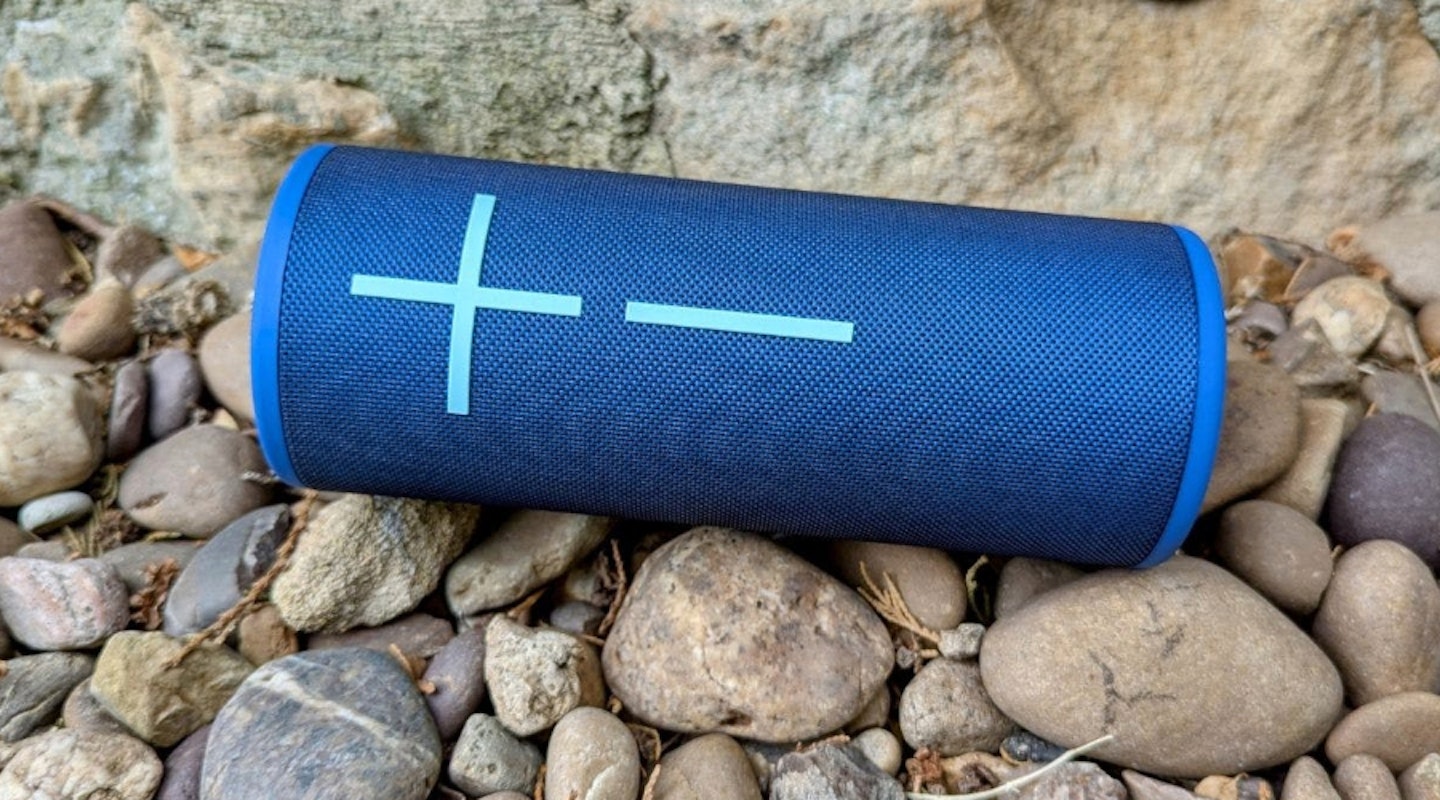 What's The Best/Steven Shaw
What's The Best/Steven Shaw"A great compact speaker that delivers superbly clear sound at an affordable price". Find out more about the Boom 4 in the full review from tech expert Steven Shaw.
Pros
- Compact, lightweight design
- Waterproof and durable
- Very clear sound
Cons
- Sound can seem a little thin at lower volumes
- Striking design won't be to all tastes
| Drivers | Two 40mm active drivers and two 46.1 x 65.2 mm passive radiators |
| Frequency response range | 90Hz-20kHz |
| Connectivity | Bluetooth |
| Bluetooth version | 5.0 |
| Play time | 15 hours based on listening at 30% volume |
| Charging time | Less than 3 hours |
| IP rating | IP6745 metres |
| Dimensions | 184 x 73 x 73 mm |
| Weight | 620 grams |
| Wireless range | 45 metres |
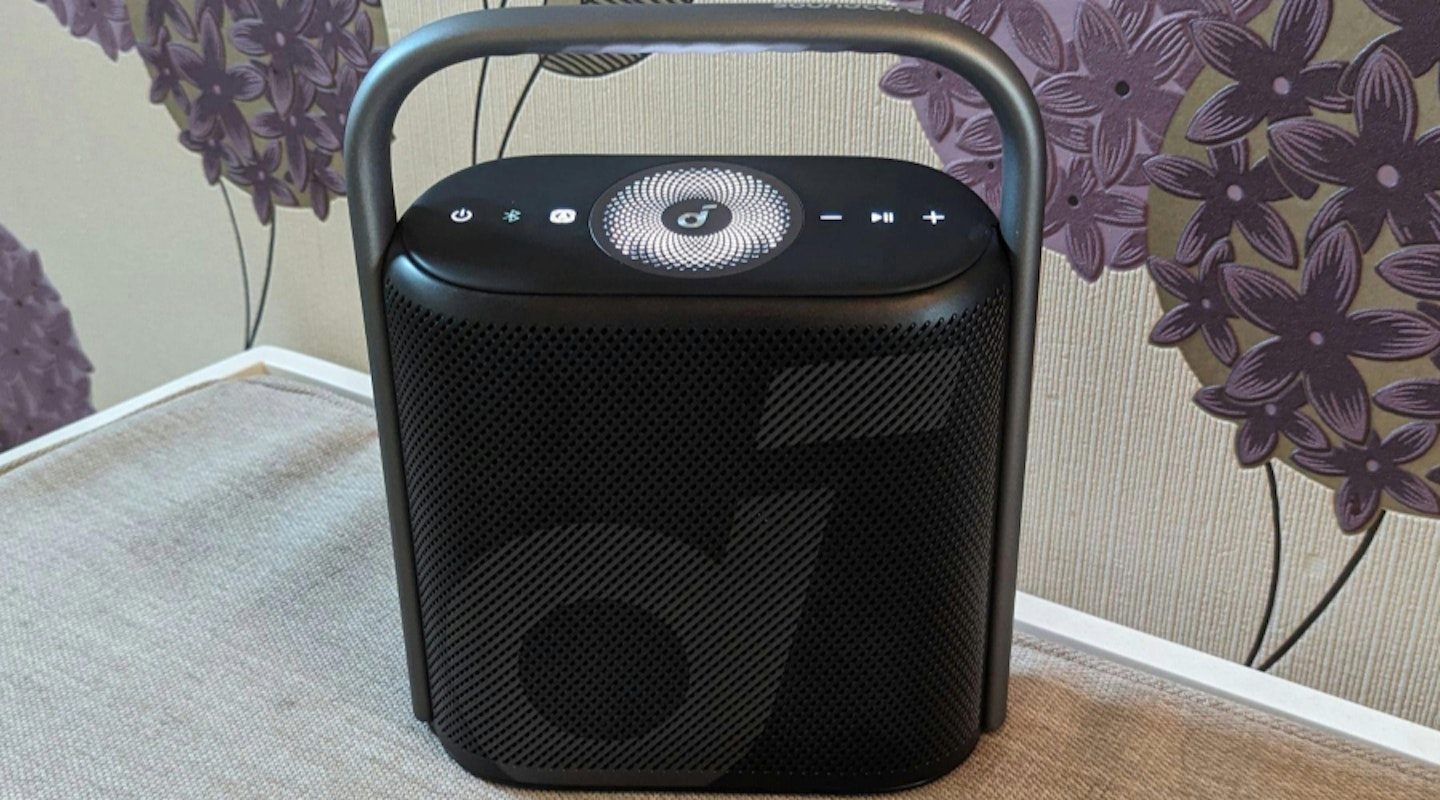 What's The best/Kyle Purves
What's The best/Kyle PurvesKyle Purves struggled to find fault with the Soundcore Motion X500. It's taken the title of the best desk speaker in our summary of the best Anker speakers.
Pros
- Fantastic audio projection and potential volume
- Very refined sound quality for the size
- Ideal shape and size keep it very portable
- Reliable battery life that's no trouble to charge up again
- Brilliant waterproofing gives it potential as a shower speaker
Cons
- Wish the upwards-facing driver was a little bit bigger
| Drivers | Full-range drivers x 2, upward-firing driver x 1 |
| Audio power | 40W |
| Battery life | 12 hours |
| Charging time | Approx. 5 hours |
| Waterproofing | IPX7 |
| Dimensions | 22 x 20.2 x 8.1 cm |
| Weight | 2.12kg |
Who tested the Emberton III?
David Ker tested the Emberton III over a couple of weeks. He did so by charging and playing the speaker as well as adjusting its functions via the Marshall app. He judged it against manufacturer claims and how it fared against rival products of a similar price. He focussed on sound quality, ease of use and design.
Why should you trust us?
At What's The Best, our mission is to provide accurate and reliable reviews, ensuring our readers receive honest and transparent information about the best technology products available. Anything less would undermine our commitment to being a trusted source of unbiased product information.
Our dedicated in-house writing team comprises experts with extensive experience and a genuine passion for technology. Collectively, we have spent decades testing and writing about tech, leveraging our expertise in all our articles, advice pieces and reviews.
We maintain complete editorial independence and do not accept payment for product reviews. Our writers have full control over their content, ensuring that products are selected based solely on the needs of our readers. While we may earn commissions or other compensation from links on our website, this never affects our product choices. These links enable us to continue offering valuable consumer advice, without compromising the integrity of our reviews.
How What's The Best test products
Struggling to navigate the audio world? We provide unbiased reviews for real listeners.
At What's The Best, we ditch the technical jargon and deliver sound reviews for sound people. Our team of audio enthusiasts puts everyday speakers, headphones, and more through their paces in real-world listening scenarios. We don't waste your time with staged tests – we focus on how these products actually perform for everyday music lovers.
The result? Unbiased buying advice you can trust. We only review the most relevant and impactful audio products on the market, so you know you're getting the latest insights. Can't find a review for your specific gear? We're constantly expanding our review database, so stay tuned!
Want to dive deeper into how we test audio products? Visit our dedicated page detailing how we go about performing our audio reviews.
David Ker is a journalist with a decade's experience in print and digital publishing. He appreciates technology made with its environmental impact in mind and which presents him a further means to pursue his love of music, reading, games, TV and film. Above all, with so many options out there, he's interested in products that display something out of the ordinary and offer value for money. Hard to please, he assures What's The Best readers that he'll be a discerning critic on their behalf.
Subscribe to the What's The Best Newsletter to keep up to date with more of the latest reviews and recommendations from the What's The Best team.
